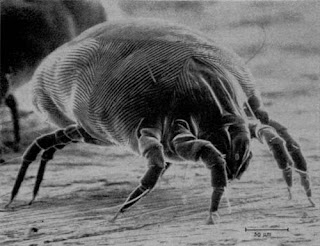 Spring will soon be here - and so will allergy season. If anyone in your house suffers from asthma or allergies, there are some specific steps you can take to decrease their suffering. These are things my family's allergy specialists recommend, and I've seen first hand how they make a serious difference in how we make it through the season.
* Use covers designed to block dust mites from pillows, comforters, and mattresses. The best covers are made of snugly woven synthetic fabric; avoid covers made of vinyl (they're hot) or anything that resembles paper towels (they have to be replaced constantly). Also be aware that "hypoallergenic" covers aren't the same as dust-mite blocking covers, which work by depriving dust mites of the water and skin that normally build up in bedding (and which they need to survive). Covers also keep any allergens already in the pillows away from allergy sufferers. If you use covers, you don't need to wash your pillows; just wash the pillowcase weekly and the case itself several times a year.
Spring will soon be here - and so will allergy season. If anyone in your house suffers from asthma or allergies, there are some specific steps you can take to decrease their suffering. These are things my family's allergy specialists recommend, and I've seen first hand how they make a serious difference in how we make it through the season.
* Use covers designed to block dust mites from pillows, comforters, and mattresses. The best covers are made of snugly woven synthetic fabric; avoid covers made of vinyl (they're hot) or anything that resembles paper towels (they have to be replaced constantly). Also be aware that "hypoallergenic" covers aren't the same as dust-mite blocking covers, which work by depriving dust mites of the water and skin that normally build up in bedding (and which they need to survive). Covers also keep any allergens already in the pillows away from allergy sufferers. If you use covers, you don't need to wash your pillows; just wash the pillowcase weekly and the case itself several times a year.* Purchase allergy-reducing pillows. Some people are allergic to what pillows are stuffed with. Common allergy triggers include feathers, down, and buckwheat. Alpaca wool may be the best choice for serious allergy sufferers; this stuffing is considered the most dust mite, mold, and mildew resistant. * Wash bedding weekly in hot water (at least 130 degrees F.) to kill dust mites and wash away other allergens. * Regularly use a vacuum with a HEPA filter. How often you need to vacuum depends upon whether you have animals in the house and how resistant your home is to outside allergens. However, during allergy season, it's wise to vacuum at least twice a week.
 * Use air conditioners; they help keep pollen and mold out of your house. If you can afford to do so, purchase good-quality HEPA air filters if you suffer from non-dust mite allergies. If you can only buy one air filter, put it in your bedroom. Do not use ozone-style air cleaners; these may actually cause or worsen asthma, according to the EPA.
* Keep pets outdoors if possible; at the very least, keep them out of bedrooms at all times, so allergy sufferers can get a better night's rest.
* If you're allergic to dust mites, keep the humidity in your house below 50 percent; too much humidity makes the dust mite population multiply quickly.
* Keep windows closed during allergy season.
* Before you head outside, check out Pollen.com; if pollen is high in your area, stay inside for the day.
* Consider an allergy reducing spray like Clorox Anywhere Anti-Allergen Fabric Spray. Some allergy sufferers believe these sprays, which claim to reduce 90 percent of allergens, really help. In our house, we've never found they reduce symptoms the way other steps do, and I've been unable to find any scientific studies that back these sprays up.
* Use air conditioners; they help keep pollen and mold out of your house. If you can afford to do so, purchase good-quality HEPA air filters if you suffer from non-dust mite allergies. If you can only buy one air filter, put it in your bedroom. Do not use ozone-style air cleaners; these may actually cause or worsen asthma, according to the EPA.
* Keep pets outdoors if possible; at the very least, keep them out of bedrooms at all times, so allergy sufferers can get a better night's rest.
* If you're allergic to dust mites, keep the humidity in your house below 50 percent; too much humidity makes the dust mite population multiply quickly.
* Keep windows closed during allergy season.
* Before you head outside, check out Pollen.com; if pollen is high in your area, stay inside for the day.
* Consider an allergy reducing spray like Clorox Anywhere Anti-Allergen Fabric Spray. Some allergy sufferers believe these sprays, which claim to reduce 90 percent of allergens, really help. In our house, we've never found they reduce symptoms the way other steps do, and I've been unable to find any scientific studies that back these sprays up.










No comments